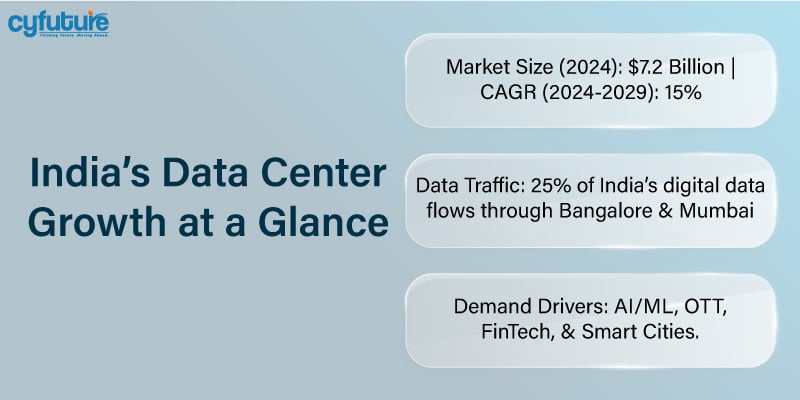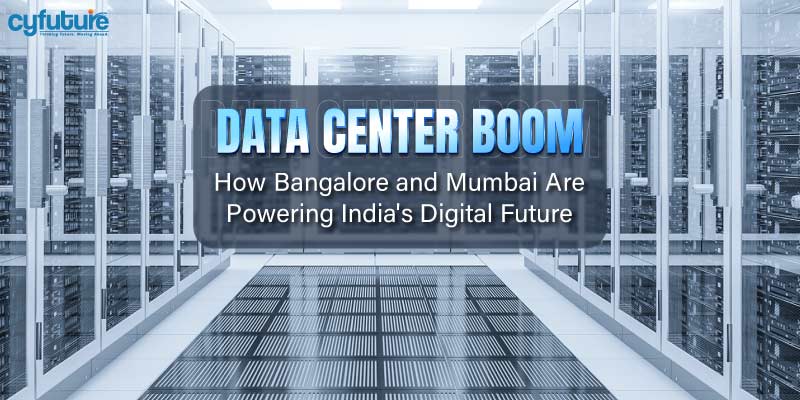 2721 Views
2721 Views
India is experiencing an unprecedented digital revolution, driven by rapid cloud adoption, AI advancements, IoT expansion, and 5G deployment. At the heart of this transformation are data centers, the critical infrastructure powering the nation’s digital economy. Among India’s key cities, Bangalore and Mumbai have emerged as the country’s leading data center hubs, fueling innovation, economic growth, and technological advancements.
In this blog, we explore the data center boom in Bangalore and Mumbai, analyzing their strategic advantages, growth drivers, and the role they play in shaping India’s digital future.

Why Data Centers Are Crucial for India’s Digital Growth
Before diving into the specifics of data center Bangalore and data center Mumbai, it’s essential to understand why data centers are the backbone of India’s digital economy:
- Cloud Computing & SaaS Growth: Businesses are rapidly migrating to cloud-based solutions, increasing demand for scalable data center infrastructure.
- 5G & Edge Computing: The rollout of 5G requires low-latency data processing, necessitating more localized data centers.
- AI & Big Data Analytics: AI-driven applications rely on high-performance computing, which data centers provide.
- E-commerce & Digital Payments: Platforms like Flipkart, Amazon, and UPI-based transactions require robust, low-latency data storage solutions.
- Government Initiatives: Policies like Digital India and Data Localization mandates are accelerating data center investments.
Given these factors, India’s data center market is expected to grow at a CAGR of 15-20%, reaching $10 billion by 2026.
Bangalore: India’s Silicon Valley and the Rising Data Center Hub
1. Bangalore’s Technological Edge
Known as the “Silicon Valley of India”, Bangalore has long been the epicenter of IT innovation, housing global tech giants like Google, Microsoft, Infosys, and Wipro. This strong IT ecosystem makes it a natural choice for data center expansion.
2. Key Drivers of Data Center Growth in Bangalore
- Startup & IT Hub: Over 40% of India’s startups are based in Bangalore, requiring high-performance data center Bangalore solutions for scalability.
- AI & R&D Investments: Companies like NVIDIA, Intel, and IBM have AI research labs here, demanding high-density computing power.
- Government Support: Karnataka’s Data Center Policy 2022 offers incentives like power subsidies, land allocation, and tax benefits to attract investments.
- Renewable Energy Availability: Bangalore’s proximity to solar and wind energy sources supports green data center initiatives.
3. Major Data Center Players in Bangalore
- Cyfuture Cloud: Offers hyperscale and colocation data centers with high-security compliance.
- ST Telemedia Global Data Centres (STT GDC): One of the largest providers with multiple facilities.
- CtrlS: Known for its Tier-IV certified data centers with 99.995% uptime.
- NTT Netmagic: Provides cloud and managed hosting solutions for enterprises.
4. Future Outlook for Bangalore’s Data Centers
With increasing demand from OTT platforms, fintech, and cloud providers, Bangalore is set to become a top-tier data center destination, rivaling global hubs like Singapore and Virginia.
Mumbai: India’s Financial Capital and the Largest Data Center Market
1. Mumbai’s Strategic Advantages
Mumbai is not just India’s financial capital but also the largest data center hub, accounting for ~45% of India’s total data center capacity. Key reasons for its dominance:
- Undersea Cable Connectivity: Major international subsea cables like Mumbai-AE, SEA-ME-WE, and Tata TGN land here, ensuring ultra-low latency global connectivity.
- Proximity to Financial Institutions: Banks, stock exchanges (BSE, NSE), and fintech firms require near-zero latency for high-frequency trading.
- Favorable Climate for Cooling: Coastal location allows for energy-efficient cooling solutions, reducing operational costs.
2. Growth Drivers for Data Center Mumbai
- Digital Banking & Fintech Boom: With UPI transactions crossing 10 billion monthly, Mumbai’s data centers ensure seamless financial operations.
- Media & Entertainment Demand: Netflix, Amazon Prime, and Disney+ Hotstar rely on Mumbai’s edge data centers for content delivery.
- JIO & Cloud Expansion: Reliance Jio’s cloud and 5G push is driving massive hyperscale data center investments.
- Maharashtra’s Data Center Policy: Offers power tariff discounts, stamp duty waivers, and infrastructure support to attract investors.
3. Leading Data Center Providers in Mumbai
- Yotta (Hiranandani Group): Home to Asia’s largest data center park in Navi Mumbai.
- STT GDC & NTT Netmagic: Major players with Tier-IV facilities catering to hyperscale demands.
- Equinix & Digital Realty: Global giants expanding their footprint in Mumbai.
- Cyfuture India: Provides secure, scalable, and compliant data center solutions for enterprises.
4. Future of Mumbai’s Data Center Industry
Mumbai is expected to double its data center capacity by 2026, with new projects in Navi Mumbai, Thane, and Pune. The city will remain India’s undisputed data center leader, supported by global cloud providers (AWS, Azure, Google Cloud) setting up local zones.
Bangalore vs. Mumbai: Which is the Better Data Center Location?
| Factor |
Bangalore |
Mumbai |
| Primary Industry |
IT, Startups, R&D |
Finance, Media, Cloud Hyperscalers |
| Connectivity |
Strong domestic links |
Best international subsea cables |
| Power Costs |
Moderate (renewable options) |
Higher but improving with policies |
| Real Estate Costs |
High (limited land) |
Expensive but ample supply in Navi Mumbai |
| Regulatory Support |
Karnataka Data Center Policy |
Maharashtra Data Center Policy |
| Future Growth |
AI, IoT, Edge Computing |
Hyperscale, Fintech, OTT Expansion |
Conclusion:
- Choose Bangalore for AI, cloud startups, and IT-driven workloads.
- Opt for Mumbai for financial services, hyperscale cloud, and global connectivity.
Challenges & Solutions in India’s Data Center Expansion
India’s data center industry is growing rapidly, but it still faces several challenges that could hinder its expansion. Below is a detailed breakdown of these challenges and their potential solutions:
1. Power Dependency: High Energy Costs & Grid Instability
Challenge:
- Data centers consume massive amounts of electricity for servers, cooling, and networking.
- India’s power grid is often unstable, leading to downtime risks.
- High electricity costs (especially in cities like Mumbai) impact operational expenses.
Solution:
-
Adoption of Renewable Energy:
- Solar & Wind Power: Many data centers are shifting to solar panels and wind farms to reduce dependency on the grid.
- Hydroelectric Power: Some facilities in Karnataka and Himachal Pradesh use hydroelectricity for cleaner energy.
- Battery & Diesel Backup: Large-scale UPS systems and generators ensure uninterrupted power during outages.
- Energy-Efficient Cooling: Liquid cooling and AI-based cooling optimization reduce power consumption.
Example:
- Yotta Data Center (Navi Mumbai) uses solar power to supplement its energy needs.
- CtrlS (Bangalore) employs AI-driven cooling systems to cut electricity usage.
2. Land & Infrastructure Constraints (Especially in Mumbai & Bangalore)
Challenge:
- Mumbai and Bangalore are densely populated, making land acquisition expensive.
- High real estate costs and limited space restrict large-scale data center expansions.
- Traffic congestion in these cities complicates logistics for construction and maintenance.
Solution:
-
Expansion to Peripheral Locations:
- Navi Mumbai: Emerging as a new data center hub with more affordable land.
- Hyderabad & Pune: Offer lower land costs, better infrastructure, and government incentives.
- Vertical Data Centers: Some companies are building multi-story data centers to maximize space.
- Modular & Prefabricated Data Centers: These can be quickly deployed in smaller spaces.
Example:
- ST Telemedia GDC is expanding in Pune and Hyderabad due to lower land costs.
- AdaniConnex is developing a massive data center campus in Chennai to ease Mumbai’s congestion.
3. Skilled Workforce Shortage (Need for Data Center Specialists)
Challenge:
-
The rapid growth of data centers has created a shortage of trained professionals in:
- Data center operations (cooling, power management).
- Cybersecurity & compliance.
- Cloud and AI infrastructure management.
- Many engineers lack specialized training in data center technologies.
Solution:
-
Industry-Academia Partnerships:
- Collaborations with IITs, NITs, and private IT institutes to introduce data center-specific courses.
- Certification programs (like CDCP, CDFOM) to upskill professionals.
- On-the-Job Training: Companies like NTT Netmagic and Cyfuture run internal training programs.
- Global Talent Recruitment: Hiring experts from Singapore, the US, and Europe to fill skill gaps.
Example:
- NASSCOM has launched skill development programs for data center technicians.
- Google & AWS are investing in cloud infrastructure training in India.
4. Cybersecurity Risks (Rising Threats to Digital Infrastructure)
Challenge:
- Data centers store sensitive financial, healthcare, and government data, making them prime targets for cyberattacks.
- Increasing cases of ransomware, DDoS attacks, and insider threats.
- Compliance risks due to strict data localization laws (like RBI’s data storage mandate).
Solution:
-
AI-Driven Security:
- Machine learning-based threat detection to identify anomalies in real time.
-
Multi-Layered Firewalls & Encryption:
- Zero Trust Architecture (ZTA) ensures strict access controls.
-
Compliance with ISO 27001, PCI-DSS, and GDPR:
- Ensures adherence to global security standards.
-
Regular Security Audits & Penetration Testing:
- Identifies vulnerabilities before hackers exploit them.
Example:
- Cyfuture’s Mumbai data center uses AI-powered SOC (Security Operations Center) for 24/7 monitoring.
- CtrlS’s Bangalore facility is Tier-IV certified, ensuring 99.995% uptime and military-grade security.
How Cyfuture is Powering India’s Data Center Revolution
As a leading data center and cloud solutions provider, Cyfuture plays a pivotal role in India’s digital growth with:
- Hyperscale Data Centers: In Bangalore & Mumbai with 99.99% uptime.
- Green Energy Initiatives: Solar-powered facilities for sustainable operations.
- AI-Driven Security: Advanced threat detection and DDoS protection.
- Compliance & Certifications: ISO 27001, PCI-DSS, GDPR-ready infrastructure.
Whether you’re a startup, enterprise, or hyperscaler, Cyfuture’s data center solutions ensure scalability, security, and performance.
The Future of Data Centers in India
- Edge Computing: Smaller edge data centers will rise in Tier-2 cities.
- AI-Optimized Facilities: Data centers will integrate AI for predictive maintenance.
- Hybrid & Multi-Cloud Adoption: Enterprises will leverage both private and public cloud via colocation.
- Sustainable Data Centers: More green energy adoption and liquid cooling technologies.

Conclusion: Bangalore & Mumbai – The Twin Engines of India’s Digital Economy
The data center boom in Bangalore and Mumbai is a testament to India’s accelerating digital transformation. While Mumbai dominates with hyperscale and financial services, Bangalore leads in AI, cloud, and startup-driven demand. Together, they are powering India’s digital future, making the country a global data center powerhouse.
For businesses looking to leverage secure, high-performance data centers, Cyfuture’s Bangalore and Mumbai facilities offer the ideal infrastructure to scale, innovate, and thrive in the digital age.
Related Posts in This Category

